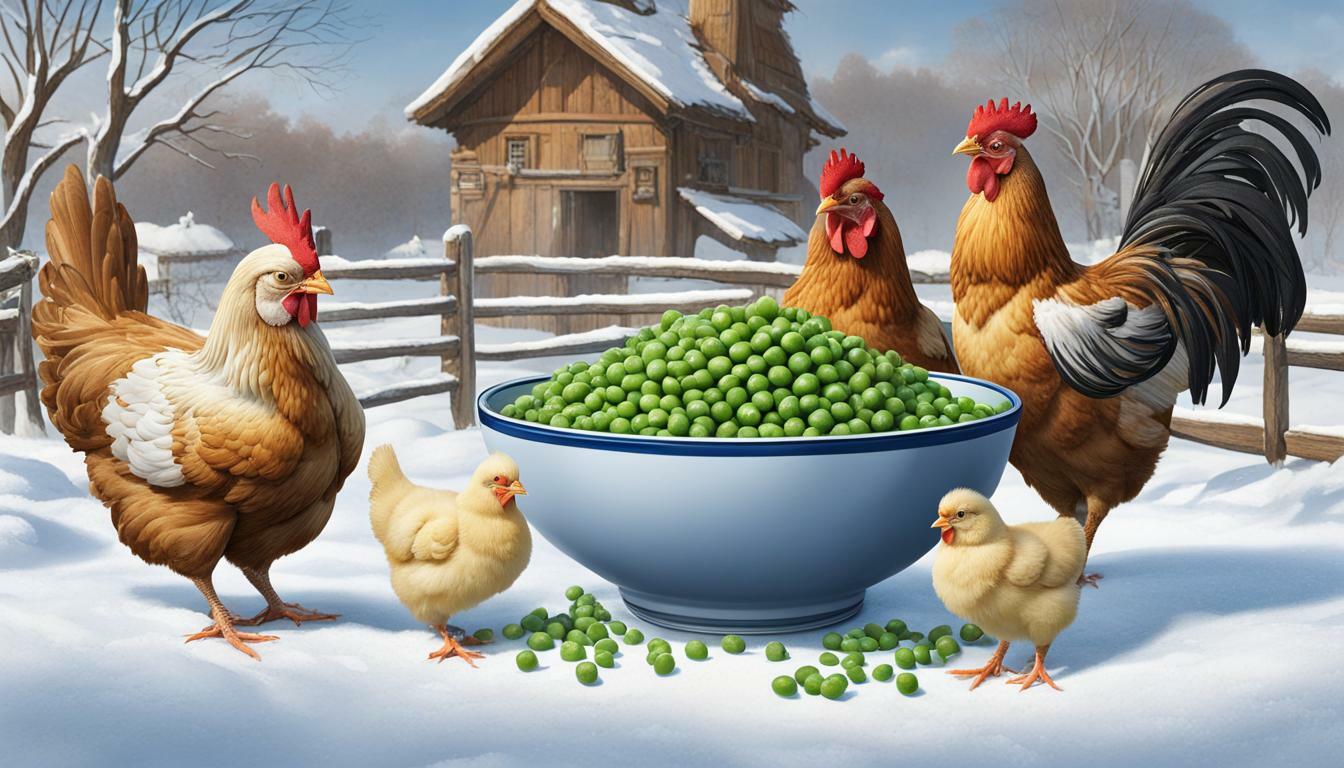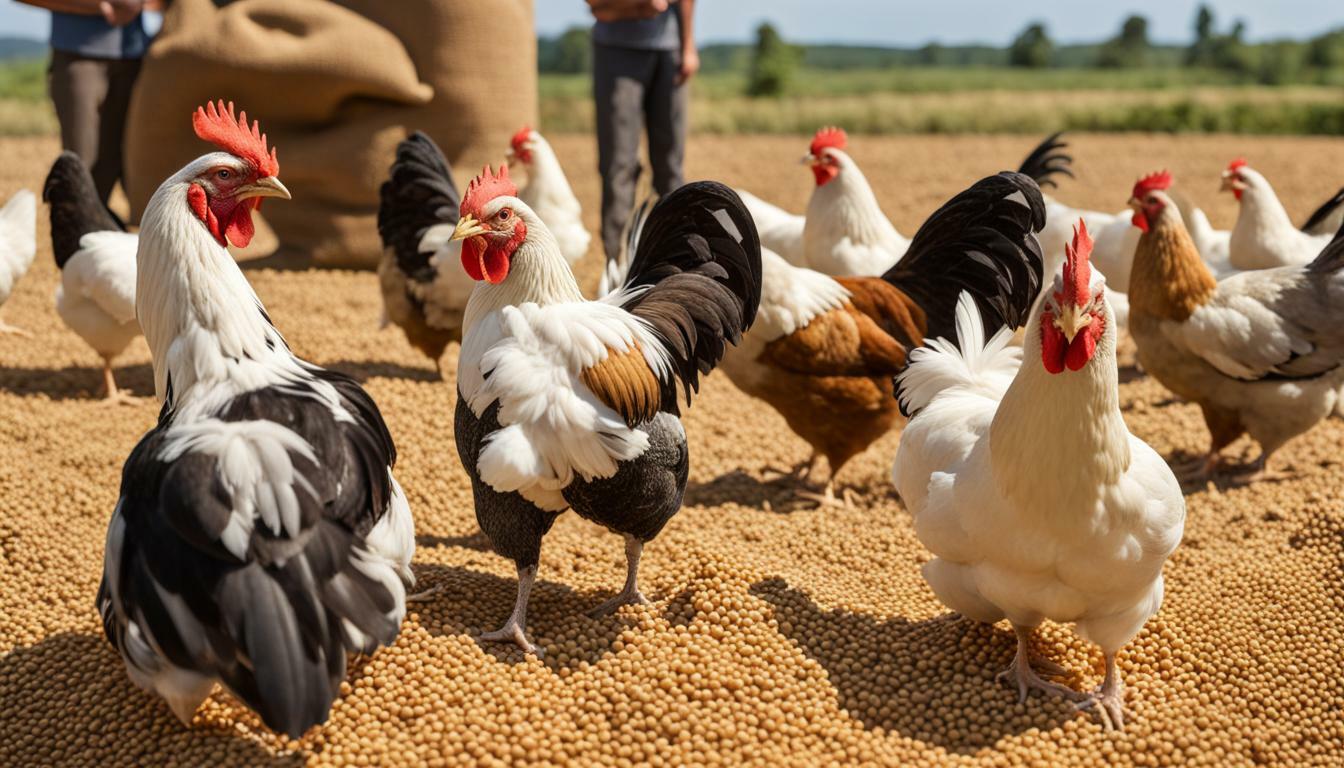Can Chickens Eat Frozen Peas? Discover The Truth Today!

Table of content:
- Are Frozen Peas Safe for Chickens?
- How to Prepare Frozen Peas for Chickens
- Do Chickens Like Eating Peas?
- How Many Peas Can You Feed a Chicken?
- Should You Cook Frozen Peas Before Feeding?
- Feeding Frozen Peas Directly from the Bag
- Potential Risks of Feeding Peas to Chickens
- Recommended Feeding Portions for Peas
- Combining Peas with a Balanced Diet
- Are Frozen Peas a Healthy Chicken Snack?
- Final Thoughts
Chickens can safely eat frozen peas as part of a balanced diet. Frozen peas provide chickens with important vitamins, minerals, and nutrients. However, there are some things to consider before feeding frozen peas to make sure your chickens get the most nutritional benefit.
Are Frozen Peas Safe for Chickens?
Frozen peas are safe for chickens to eat. When feeding frozen produce, it’s always best to thaw it first. Feeding frozen foods directly from the freezer can cause crop impaction or frostbite in a chicken’s crop and digestive system.
As long as the peas are thawed first, chickens can digest them easily. Peas contain antioxidants, beta carotene, vitamins C and K, folate, fiber, and more. This makes them a nutritious snack.
When introducing any new food, start slowly with small amounts. Look for any signs of diarrhea, digestive upset, or refusal to eat. If your chickens tolerate the peas well, you can increase the portion size over time.
How to Prepare Frozen Peas for Chickens
To prepare frozen peas for chickens:
- Thaw the peas first. Don’t feed directly frozen.
- Thaw in the refrigerator overnight. Do not microwave as this alters nutrients.
- Rinse under cool water to remove ice crystals.
- Mash slightly with a fork to make them easier to digest.
You can also blanch thawed peas quickly in boiling water for 1-2 minutes to soften them up before feeding. This makes the natural sugars in the peas more accessible too. Just don’t overcook them.
Make sure thawed peas do not sit out at room temperature for more than 2 hours before feeding to prevent bacterial growth. Discard any peas your chickens don’t eat right away.
Do Chickens Like Eating Peas?
Most chickens love eating peas. Both adult chickens and chicks enjoy the sweet taste and soft texture of this veggie treat.
Peas offer nutrients like:
- Vitamin C, K, A, B vitamins – Support immune health and organ function.
- Protein – Important for muscle maintenance and feather growth.
- Carbohydrates – Provide energy.
- Fiber – Supports digestion.
- Antioxidants – Reduce cell damage.
The protein, vitamins, and natural sugars in peas make them a nutritious supplementary food for backyard chickens. They provide a good energy boost too.
How Many Peas Can You Feed a Chicken?
Adult chickens can eat 1/2 cup of thawed, softened peas per bird 2-3 times a week. This is a reasonable amount that provides health benefits without overdoing it.
For younger chicks under 16 weeks old, feed peas in smaller amounts like 1-2 tablespoons per chick daily.
Never feed chickens unlimited peas, as overconsumption may lead to loose stools, gastrointestinal issues, or poor absorption of other nutrients. Stick to the recommended serving sizes.
Monitor your chickens’ droppings when first feeding peas. Loose, watery stool could indicate digestive upset from too many peas. In this case, reduce the portion size.
Should You Cook Frozen Peas Before Feeding?
Cooking frozen peas before feeding is optional. Simply thawing first makes peas gentler on the digestive system.
If you want to soften them further or increase digestibility, briefly cooking thawed peas can help. You can:
- Microwave 30-60 seconds.
- Steam or blanch for 1-2 minutes.
- Sauteé lightly in olive oil.
Avoid overcooking, as excess heat destroys the vitamin C content. Cook just until warmed through and slightly softened.
Cook only the amount your chickens will eat in one feeding. Refrigerate and use leftover cooked peas within 3-4 days.
Feeding Frozen Peas Directly from the Bag
It’s best not to feed frozen peas to chickens straight from the freezer bag. Frozen peas can cause frostbite or crop impaction.
Crop impaction is when the crop (storage pouch) gets blocked by partially frozen food. This prevents the chicken from fully digesting and can lead to starvation.
Always thaw frozen foods before feeding. Let the peas defrost overnight in the fridge or hold them under cool running water to quickly thaw. Never microwave to thaw, as this starts cooking the peas.
Feed peas at room temperature or just slightly warmed for the safest digestion.
Potential Risks of Feeding Peas to Chickens
While peas are a healthy treat, there are a few potential risks to keep in mind:
- Crop impaction – As mentioned, feeding frozen peas can obstruct the crop. Always thaw first.
- Diarrhea – Too many peas may cause loose stool. Stick to the recommended serving sizes.
- Allergies – Chickens can rarely develop food allergies. Monitor for any signs like swelling or itchy skin.
- Nutritional imbalances – Peas lack calcium, so ensure a balanced diet with additional sources.
- Moldy peas – Don’t feed moldy or rotten produce, as it contain toxins.
Using fresh, thawed peas in moderation is very unlikely to cause issues. But it’s smart to supervise chickens during feeding time and monitor their health.
Recommended Feeding Portions for Peas
Here are some general guidelines for how much thawed, softened peas to feed chickens:
- Laying hens: 1/4 cup peas per hen, 2-3 times weekly
- Large roosters: 1/3-1/2 cup peas, 2-3 times weekly
- Chicks under 16 weeks: 1-2 tablespoons peas per chick, daily
- Ducks: 1/2 cup per duck, 2-3 times weekly
- Geese: 2/3 cup per goose, 2-3 times weekly
Adjust portions based on your birds’ sizes and preferences. Provide less if peas cause loose droppings. Sprinkle on top of feed or serve peas in a separate dish.
Combining Peas with a Balanced Diet
While nutritious, peas should not make up your chickens’ entire diet. They lack sufficient calcium and protein compared to commercial feed.
Make sure your chickens have free-choice access to a quality complete feed as their dietary staple. This provides the carbs, protein, fat, vitamins, and minerals needed in balanced amounts.
Offer peas as a supplemental snack a few times a week. Combine with other fresh foods like leafy greens, carrots, berries, and small amounts of fruit.
A diverse diet utilizing feed, fresh treats, and occasional kitchen scraps keeps backyard chickens healthiest. Taking care to include calcium sources like oyster shells is important too when feeding produce high in phosphorus like peas.
Are Frozen Peas a Healthy Chicken Snack?
Frozen peas make a nutritious supplemental food for chickens when fed properly. Their sweet taste and soft texture make them a preferred backyard treat.
For optimal health benefits, thaw frozen peas fully and mash or blanch lightly before feeding. Portion out 1/4 to 1/2 cup per adult chicken, 2-3 times weekly. Adjust amounts for younger and smaller birds.
Mix peas into feed or offer as a snack on their own. Pair peas with other fresh, healthy foods like leafy greens to round out vitamin and mineral intake.
While chickens love peas, they lack key nutrients like calcium, so a quality complete feed is still essential. Use peas to add variety alongside balanced main meals. With proper thawing and portion sizes, peas can be a healthy, safe snack from your freezer.
Final Thoughts
Frozen peas offer backyard chickens an enticing, nutritious supplement to their diet. Thawed and fed in moderation, peas provide protein, antioxidants, fiber, vitamins, and more. Chickens enjoy their sweet taste and soft texture.
Take care to thaw frozen peas fully before feeding to prevent crop issues. Light cooking can further increase digestibility. Mix 1/4 to 1/2 cup thawed peas into feed or serve as a separate snack 2-3 times weekly. Adjust portions based on the age and size of your flock.
While nutritious, peas lack calcium, so continue providing a balanced commercial feed as the dietary foundation. Partner peas with other fresh foods for a varied nutritional boost. With safe handling and reasonable portions, frozen peas can be a healthy, natural treat from the freezer your backyard chickens will love.
Welcome. I’m Adreena Shanum, the proud owner of this website, and I am incredibly passionate about animals, especially poultry. I founded adreenapets.com as a labor of love, stemming from my desire to share my knowledge and experiences with poultry enthusiasts worldwide.




